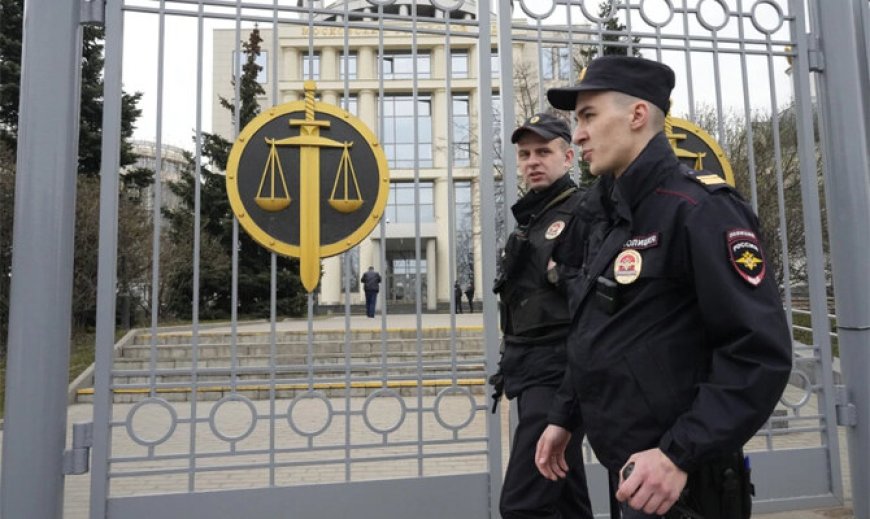Russia wants a 7-year sentence for American accused of fighting in Ukraine; it's a diplomatic tug-of- war.

Stephen Hubbard, an American citizen 72 years old who has been accused of fighting as a mercenaries for Ukraine against Russian forces, has asked a seven-year prison sentence from Russian authorities. Against the backdrop of continuous tensions between Moscow and Washington, this trial marks yet another incident in the convoluted geopolitical crisis engulfing many foreign citizens since Russia's invasion of Ukraine in February 2022.
Hubbard's case is typical of Russia's strong anti-foreign fighter posture. Russian legislation holds that engaging in mercenary activities is illegal and carries a maximum 15-year jail sentence. Prosecutors contend Hubbard paid at least $1,000 for his participation and signed a contract with the Ukrainian military soon after Russia's military invasion started. Hubbard apparently got training, a weapon, and fought alongside Ukrainian forces until he was arrested by the Russian military in April 2022 despite his age.
The prosecution's demand for a seven-year sentence notes Hubbard's age and his admission of guilt, therefore suggesting that he serve his term in a maximum-security penitentiary colony. Apart from its possible legal precedent, this case has drawn attention for its wider consequences for US-Russia ties.
Growing Conflicts About Captured Americans
Citing privacy issues, the U.S. Embassy in Moscow has confirmed awareness of Hubbard's situation but refrained making further comments. Particularly in the wake of Russia's invasion of Ukraine, the detention of American nationals in Russia has been somewhat frequent. Russia is purposefully targeting U.S. citizens to use as bargaining chips in upcoming diplomatic negotiations, raising increasing worry.
This strategy is already observable. Comprising 24 people and months of negotiations, the U.S. and Russia executed their largest post-Soviet prisoner swap in August 2023. While some Americans were released, others remain imprisoned in Russia, and their destinies lie in the balance of delicate diplomatic interactions between the two superpowers.
Legal and diplomatic repercussions
The conviction of an American citizen for fighting in Ukraine highlights the tense relations between the United States and Russia, where foreign nationals frequently become caught in the crossfire of international conflicts. With over 99 percent of their suspects found guilty, Russian courts are renowned for their nearly flawless conviction rates. Furthermore, Russian prosecutors have the right to appeal sentences they believe to be excessively lax, therefore raising the possibility that Hubbard might be sentenced to long imprisonment should he be found guilty.
This case also reflects Russia's larger perspective on the conflict in Ukraine. Moscow has consistently referred to foreign fighters—especially those from Western nations—as "mercenaries," therefore characterising them as illegal participants in the conflict. Though thousands of international volunteers, including many from the United States and Europe, have joined Ukrainian forces in different capacities, this story strengthens the Kremlin's representation of the conflict as a defensive effort against Western invasion.
The stakes for upcoming U.S.-Russia relations.
Hubbard's trial coincides with a pivotal junctural point in American-Russian ties. Washington's diplomatic ties to Moscow at their lowest point in decades have been severed by the conflict in Ukraine. Both countries keep accusing one another of interfering in global affairs, and Western sanctions have hurt Russia's economy while also isolating Moscow more deeply.
Cases like Hubbard's are probably going to be used in next negotiations considering the growing number of Americans arrested in Russia. Like past prisoner swaps, the Kremlin can ask concessions in return for their release. These interactions are powerful symbols of the deep-rooted conflicts between the two countries as well as diplomatic compromise tools.
For Hubbard, his destiny might rely on not only the Moscow legal procedures but also more general geopolitical considerations of the United States and Russia. Cases like his will continue to highlight the human cost of a war that has drawn foreign nationals and nations into Ukraine's orbit, dragging on long beyond its boundaries.













































